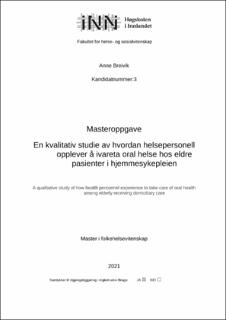En kvalitativ studie av hvordan helsepersonell opplever å ivareta oral helse hos eldre pasienter i hjemmesykepleien
Master thesis
Permanent lenke
https://hdl.handle.net/11250/2944113Utgivelsesdato
2021Metadata
Vis full innførselSammendrag
Bakgrunn: Med stigende alder vil antall personer som mottar helse- og omsorgstjenester øke, hvor vi spesielt ser en vekstøkning av antall brukere i hjemmesykepleien. I takt med denne utviklingen, vil det være økende behov for munnstell og forebyggende tiltak blant eldre i hjemmesykepleien, fordi stadig flere eldre bevarer sine naturlige tenner livet ut. Dersom den orale helsen ikke blir godt nok ivaretatt, kan det få store helsemessige konsekvenser for denne pasientgruppen.
Mål: Masteroppgaven har som mål å undersøke og få en bedre forståelse av hvordan helsepersonell opplever å ivareta den orale helsen hos eldre pasienter som mottar hjemmesykepleie. Studien er utført i en distriktskommune på Vestlandet i Norge. Det er gjort lite kvalitativ forskning på dette området i norsk sammenheng.
Metode: Studien har en kvalitativ forskingstilnærming, hvor fokusgrupper er valgt som instrument for datainnsamlingsmetode. Det er gjennomført to fokusgruppeseanser, som inkluderte fem og seks deltakere i hver gruppe. Seks deltakere var utdannet som sykepleiere, fire var hjelpepleiere, og en var helsefagarbeider. Majoriteten var kvinner (N=10).
Resultat og konklusjon: Det ble utviklet fire temaer ut fra datamaterialet: hensyn til brukermedvirkning, fravær av samhandlingsrelasjoner, varierende grad av motivasjon og teori og praksis.
De ulike temaene ser ut til å foregå i et komplekst samspill med hverandre, og indikerer at helsepersonalet står ovenfor ulike utfordringer som påvirker dem til å ivareta pasientenes orale helse. For å imøtekomme kompleksiteten som helsepersonalet erfarer, er det i et folkehelseperspektiv sentralt å adressere utfordringene på et tverrsektorielt nivå. Det innebærer at helse- og omsorgstjenesten og tannhelsetjenesten i større grad bør utvikle bedre samhandlingsrelasjoner som kan bidra til å styrke den orale helseomsorgen for disse pasientene. Det bør også rettes større oppmerksomhet mot etiske dilemmaer som oppstår i forbindelse med brukermedvirkning. Abstract
Background: The number of people receiving health and care services, especially in domiciliary care, will grow as the world’s life expectancy increases. Based on this, the need for dental care and oral health and preventive measures among the elderly in domiciliary care will also be greater due to more seniors retaining their natural teeth throughout their lifetime. Major health consequences for this patient group can be the reality if dental care and oral health is not adequately administered.
Aim: This master thesis aims to investigate and gain a better understanding of how health personnel experience administering oral health among elderly patients in domiciliary care. The study was conducted in a district municipality in Western Norway. Marginal research have been undertaken in this area in a Norwegian context.
Methods: This study has a quality research approach, where focus groups were chosen as an instrument for data collection method. Two focus group sessions were conducted, which included five and six participants in each group; six participants were trained Nurses, four Auxiliary Nurses, and one Health Care Worker. The majority were women (N= 10).
Results and conclusion: Four topics were developed based on the data material: user involvement considerations, absence of a collaborative relationship, varying degree of motivation, and theory and Practice
The various topics seem to have a complex interaction. It also illustrates that the health personnel experience various challenges which influence them in their care of the patient’s oral health. In order to meet the complexities encountered by health personnel, is it in a public health perspective central to address the challenges at a cross-sectoral level. This means that the two health services (health and care service and dental care and oral health service) should develop a better collaborative relationship in order to strengthen their service for these patients. At the same time, greater attention should be paid to ethical dilemmas that arise in connection with user participation.
